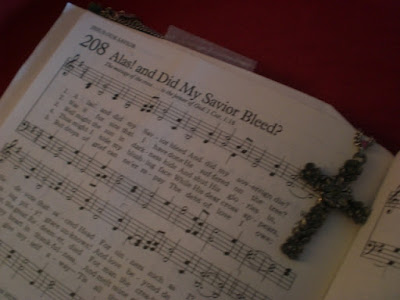The man who wrote the classic 18th century Good Friday hymn, “Alas! And Did My Savior Bleed,” was well-acquainted with rejection himself. His rejection, however, was from a woman's withdrawn love, not necessarily from his contemporaries. In fact, Isaac Watts (1674-1748) was what we'd today call a genius, a prolific and popular hymn writer (credited with some 750 hymns) and essayist.
Quickly, the backstory on his life. He was born in 1674 in Southampton, England, in a time of religious controversy. His father's dissenting views with the state church led twice to imprisonment. Biographers tell of Isaac's mother nursing baby Isaac as she sat outside the prison near his father's cell window.
As Watts grew, his genius unfolded. Even in early childhood he had a knack for rhyme which both amused and frustrated his parents. When scolded for keeping his eyes open during prayers, he replied: “A little mouse for want of stairs, ran up a rope to say its prayers.” Even after a spanking for his rhyming habit, he replied, “O father, father, pity take/And I will no more verses make.”
Because his family's theological stance was “non-conformist,” he couldn't attend the Anglican-restricted universities of Oxford or Cambridge, but instead was educated at the “Dissenting Academy.” He pastored a large independent chapel a few years, but poor health forced him to quit. Instead, he worked as a private tutor, eventually becoming a permanent resident at one of his clients' estate.
His prolific writing output included many books about the Bible, theology, logic and other topics. Add to that the huge output of hymns, including many still sung today: “When I Survey the Wondrous Cross,” “Joy to the World,” “O God, Our Help in Ages Past,” “Jesus Shall Reign Wherever the Son,” and today's feature, “Alas, and Did My Savior Bleed.”
He also wrote a book of songs that became the first hymnal ever published only for children. He loved children, but sadly never married or became a father. He did have a girlfriend, of sorts, a fan of his works whom he met by letter. When she finally traveled to meet him, she was put off by his less-than-handsome appearance. Small (five feet tall) and frail, he had a huge head and a long-hooked nose. Sadly, that ended her “crush” on him.
Frail in health, for his last thirty-plus years Watts lived with a nobleman friend (and later the friend's widow and daughter), never to know the centuries-long impacts of his hymn-writing. Notably, about 1850—a hundred years after Watts died—a 30-year-old blind woman went to a revival service in New York City. There, she heard a choir sing Watts' hymn, “Alas! And Did My Savior Bleed?” The hymn stirred her heart, especially the last line, “Here, Lord, I give my life away.” That day, she gave her life to Jesus. Her name: Fanny Crosby. Living to age 95, she would become the greatest gospel lyric composer of her time—by some sources, writing more than 8,000 hymns.

No comments:
Post a Comment